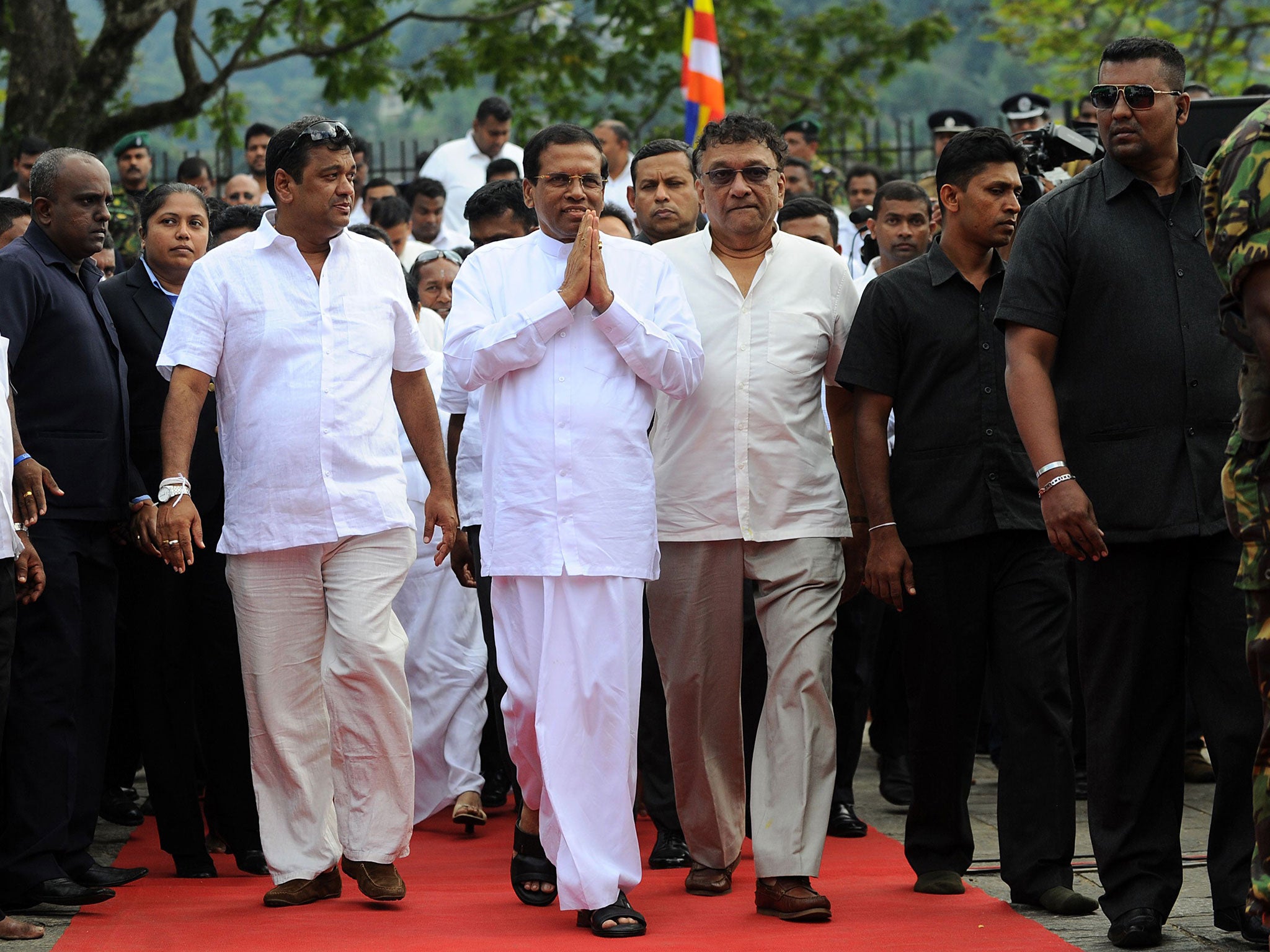Sri Lanka election: Attempted 'coup' by former president Mahinda Rajapaska to be investigated
Incumbent president tried to deploy army to stop voting when polls showed he would lose election, it is claimed. New President Maithripala Sirisena will now investigate

Your support helps us to tell the story
From reproductive rights to climate change to Big Tech, The Independent is on the ground when the story is developing. Whether it's investigating the financials of Elon Musk's pro-Trump PAC or producing our latest documentary, 'The A Word', which shines a light on the American women fighting for reproductive rights, we know how important it is to parse out the facts from the messaging.
At such a critical moment in US history, we need reporters on the ground. Your donation allows us to keep sending journalists to speak to both sides of the story.
The Independent is trusted by Americans across the entire political spectrum. And unlike many other quality news outlets, we choose not to lock Americans out of our reporting and analysis with paywalls. We believe quality journalism should be available to everyone, paid for by those who can afford it.
Your support makes all the difference.Sri Lanka’s new government will investigate an alleged attempt by former President Mahinda Rajapaksa to stage a coup to try to stay in power when results showed he was losing last week’s election.
A “special investigation” will be set up to probe the incident after the new government is formed later today, said Mangala Samaraweera, the spokesman for President Maithripala Sirisena, who came to power after winning Thursday’s poll. “Some say this was a very peaceful transition. But that’s not the truth. People should know what happened behind the scenes,” Mr Samaraweera said.
Mr Samaraweera accused Mr Rajapaksa of making an attempt to deploy the army and police to stop the counting of votes when initial results showed he was heading for defeat.
He said Mr Rajapaksa convened the chiefs of the police and the army, as well as the attorney general, at midnight on Thursday and asked them to come up with a plan to stop the vote-counting. Mr Samaraweera said the three officials opposed the move.
“People should know about the dangerous situation that existed and Mr Rajapaksa’s coup to bury the country’s democracy,” said Mr Samaraweera, adding that the new government’s first task would be “to probe this coup and reveal to the country what really took place”.
Another Sirisena ally, the MP Rajitha Senaratne, said: “The army chief got orders to deploy the troops on the ground across the country. They tried attempts to continue by force. The army chief defied all the orders he got in the last hours. We spoke to the army chief and told him not to do this. He kept the troops in the barracks and helped a free and fair election,” Mr Senaratne added.
A spokesman for Mr Rajapaksa denied the allegations and said that he had decided to transfer power after looking at the trend of the results in the early hours of Friday.
Military spokesman Brigadier Ruwan Wanigasooriya said he was unaware of any order to deploy troops. He said the military stayed out of the election process at every stage. “Sri Lanka’s military will not do anything to disrupt the democratic traditions and process,” he said.
Speculation had been rife in Colombo just before the election that force could be used to keep Mr Sirisena’s voters from polling stations or even that the military could intervene if Mr Rajapaksa looked set to lose.
President Obama congratulated Mr Sirisena on his victory in a statement on Saturday. “I also commend the outgoing administration of former President Mahinda Rajapaksa for facilitating a swift and orderly transition of power,” Mr Obama said.
Mr Sirisena took 51.3 per cent of the vote, while Mr Rajapaksa won 47.6 per cent. Mr Rajapaksa, even before the official results were announced, conceded his defeat and left his official residence.
Until a few weeks ago, Mr Rajapaksa was widely expected to easily win his third term in office. But Mr Sirisena – his former friend and Health Minister – defected from the ruling party in November, and gathered the support of other defecting politicians, opposition parties and many of Sri Lanka’s ethnic minorities, making the election a fierce political battle. Mr Sirisena contested as the combined opposition candidate.
He assumed his duties on Friday and the new government is expected to be formed today, a day before Pope Francis arrives in the island nation for a much-anticipated visit.
In his first address to the nation since the election, Mr Sirisena said his prime tasks would be to reduce the cost of living, scrap unlimited presidential powers and pass some of the powers to parliament, the cabinet, the judiciary and independent commissions.
Mr Rajapaksa was highly criticised for changing the constitution to scrap a two-term presidential limit and expand executive powers, allowing him to fill the judiciary and other offices with his appointees.
Mr Sirisena refrained yesterday from speaking about a solution to the country’s ethnic issues, which were the cause of a quarter-century of civil war that ended in 2009 when government troops defeated the Tamil Tiger rebels, who were fighting to create a separate state for ethnic minority Tamils.
Mr Rajapaksa used the popularity he gained from winning the war to win a second term as president and a majority in parliament.
Both Mr Rajapaksa and Mr Sirisena are members of Sri Lanka’s majority Sinhalese population.
AP/Reuters
Join our commenting forum
Join thought-provoking conversations, follow other Independent readers and see their replies
Comments